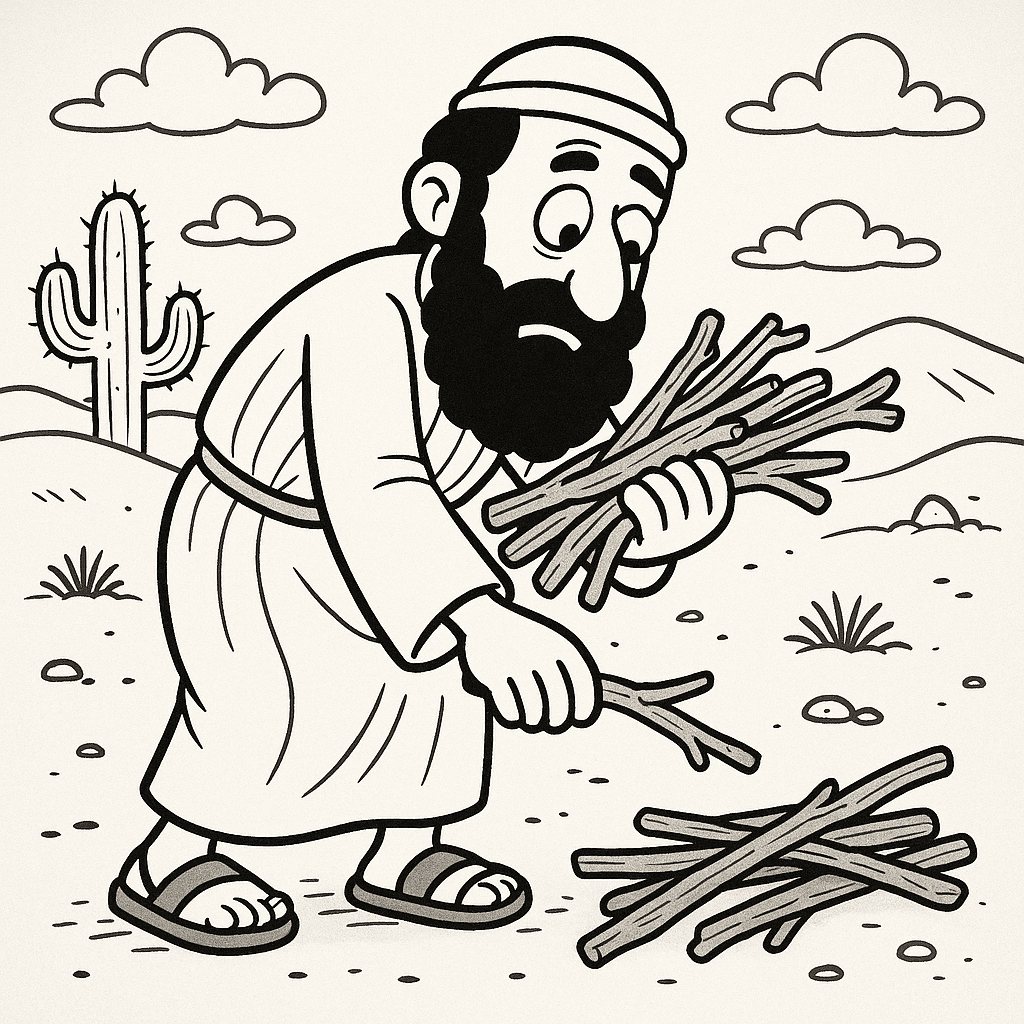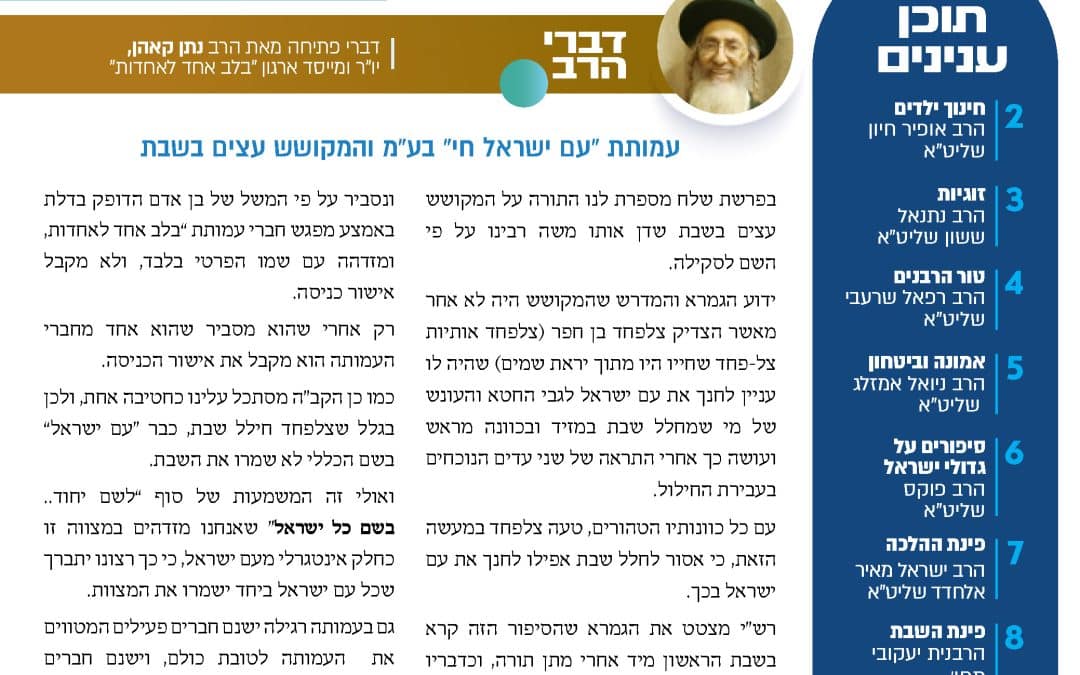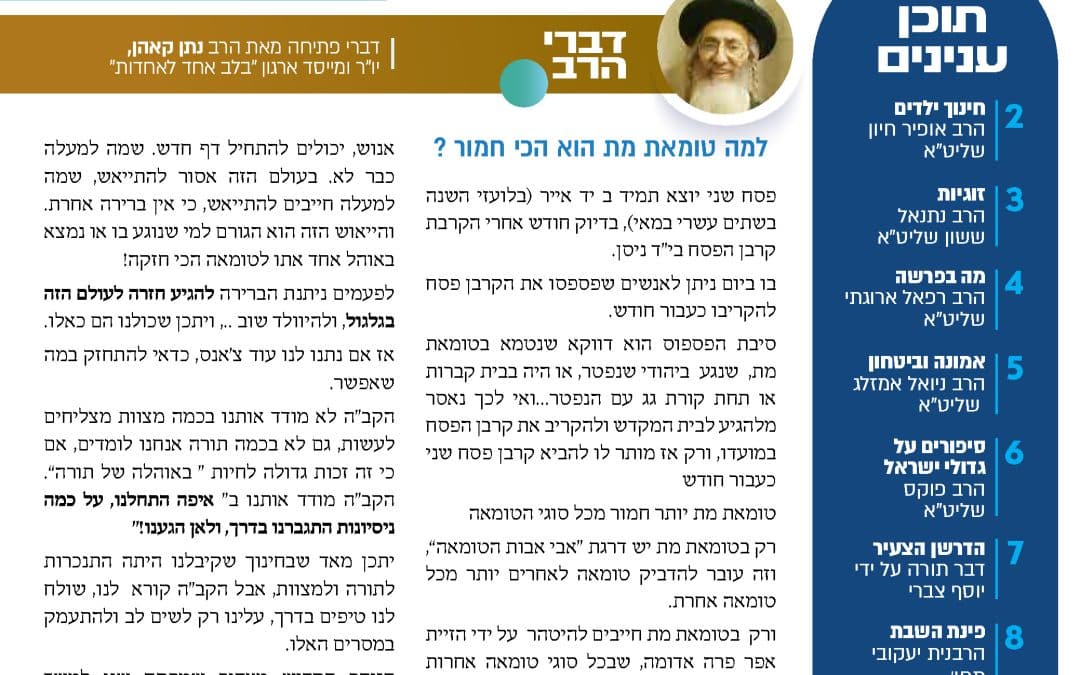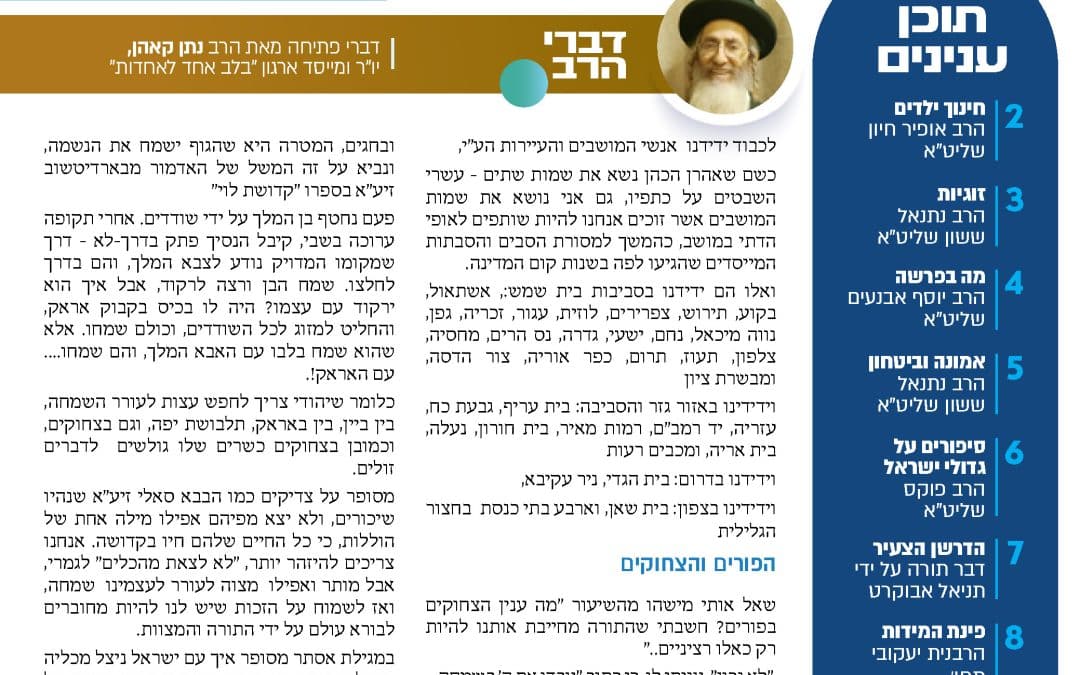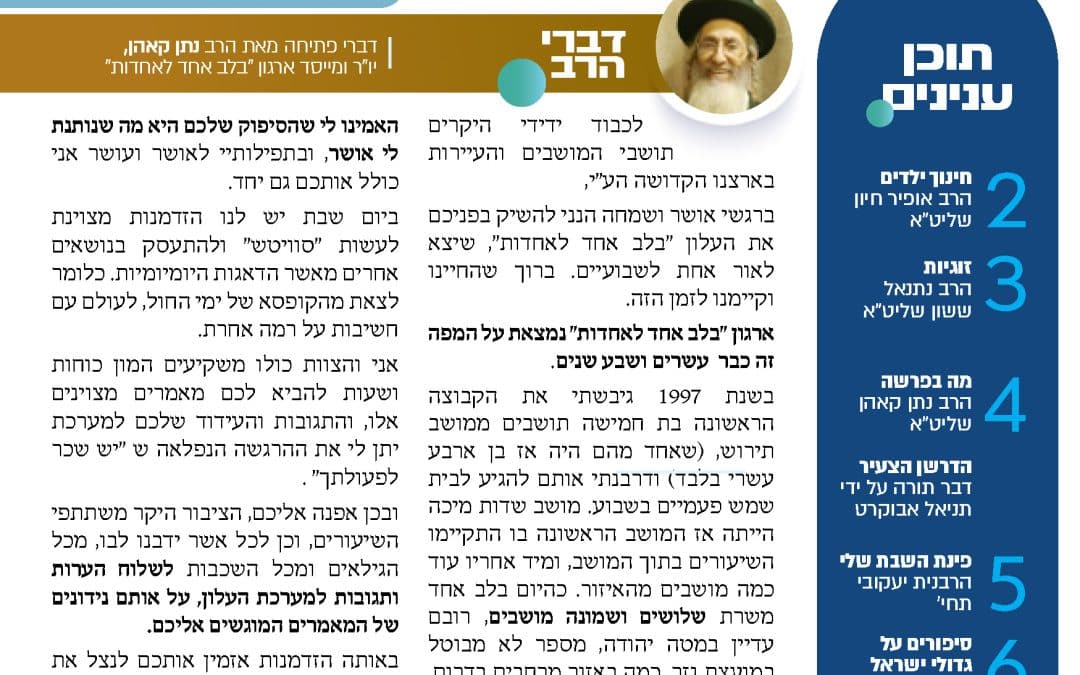Moshav Luzit was founded in 1955 by North African Jewish refugees. Taking its name from the almond trees filling the area, Luzit is largely surrounded by scenic farmland. It’s located near natural and archeological tourist attractions like the ancient Luzit Caves. Belev Echad has been inspiring its residents for the past 20 years.
Story #1 A Different Kind of Stardom
Many twelve year old Israeli boys dream about becoming national soccer champions.
Yosef Ben-Moshe was different than most. He knew his dream could easily come true.
By far the best junior player on his moshav, Yosef had already brought his team to victory in junior competitions around the country. He spent most of his spare time getting better at his sport, and loved every minute.
His parents, thrilled about their son’s exciting prospects, did everything they could to support his training, even changing around their own schedules to accommodate his training times.
As he neared his thirteenth birthday, though, they asked him to make one small shift: fit in some youth classes given by Rabbi Meir, the moshav’s Belev Echad representative. Nonobservant but fondly traditional, they believed Yosef should do something to prepare for his bar mitzvah, and these local classes were a convenient solution.
Yosef went to the first few classes curious, and came home excited. He quickly connected with Rabbi Meir and enjoyed the fascinating Torah stories and ideas he was learning. He especially liked the sound of Shabbat and its special meaning to the Jewish people.
Then came a class where Rabbi Meir started detailing the activities we hold ourselves back from on Shabbat. Yosef listened with growing apprehension. No using electricity? No driving? No traveling?
Did that mean if he wanted to keep Shabbat, he’d have to give up Saturday soccer matches?
That class sparked an inner turmoil that lasted for months. Countless tournaments – countless crucial opportunities – happened on Shabbat. Not playing in those games would limit his chances of national soccer stardom.
But if playing meant riding a bus on Shabbat… Yosef so badly wanted to keep Shabbat…
After more than a few sleepless nights, countless conversations with Rabbi Meir, and even more serious thinking, Yosef slowly stopped playing on Shabbat. Soccer still filled the rest of his week, but he skipped the Saturday matches.
His parents and coaches weren’t thrilled about his decision. Rabbi Meir had to field some angry comments about “destroying the boy’s career” and “stealing him for our moshav.” So Yosef tried to reassure everyone that he wasn’t dropping soccer. His options were still open. Perhaps he’d still become a star one day.
Years started to pass. Yosef grew stronger both in his soccer prowess and his love of Judaism. He brought both with him when he started his army service at eighteen.
Recognizing his blazing talent, the army offered him special accommodations so he could keep training and playing. On the religion front, he spent hours per week on the phone with Rabbi Meir, whose warmth and encouragement helped overcome the challenges of his new environment.
Then he left the army. “Real life” was officially beginning. And he knew he had to decide, once and for all, what he was going to do with it.
Should he throw himself completely into becoming a national soccer star – or commit to a fully Shabbat-observant life, and leave the fame behind?
It was a difficult decision. But with Rabbi Meir and Belev Echad’s loving support strengthening him, he chose Shabbos. Torah. Truth.
His Moshav lost a national soccer star. But Am Yisrael gained a faithful Shabbat keeper.
Today, at 24 years old, Yosef runs the sports department for the Beit Shemesh municipality. He arranges match schedules, trains young players, and plays in intercity games – but only when they don’t conflict with Shabbat.
A true student of Belev Echad, Shabbat is simply too precious to him.
Story #2 A Series of (Very) Fortunate Events
Sofia smiled to herself as she walked past the moshav’s social hall. On its bulletin board hung three flyers announcing autumn events she’d organized – a children’s carnival next week, a women’s gathering that Saturday, and a post-harvest family potluck at the end of the month.
Her busdriver husband, Gadi, liked to joke that with all her event-planning prowess, she ought to run one of the traveling tours he sometimes drove for. But she was content bringing people together on her own little moshav.
When we started spreading Torah on the Moshav, Sofia was one of the first people we reached out to. Though she knew virtually nothing about Judaism, she did know how to pull off an exciting social event. She was the perfect candidate to organize a women’s weekly Belev Echad shiur.
Gadi wasn’t happy about it. “A Torah class? What do we need this stuff for? Better not to get involved, Sofia.”
But Sofia laughed him off. “It’s just another excuse for a get-together. You know how I love putting these things together. I’ll make sure it’s interesting and fun – we’ll have refreshments, maybe fruit and some cakes. We’ll listen to the rabbanit talk a little, and then we’ll enjoy ourselves.”
But the evening of noshing and chatting didn’t exactly materialize. The woman found our Rabbanit’s ideas so fascinating they forgot about Sofia’s glamorous refreshment table. They listened avidly and sent questions flying at the Rabbanit, who fired back with intriguing answers.
Sofia felt a little funny coming home from that first evening. Torah, mitzvot – they were starting to make sense. She couldn’t share that with Gadi, of course, but…
After a few weeks, Sofia had undergone such a mental shift that she couldn’t hold back anymore. When she gently tried to share some of what she was learning with Gadi, however, he let out a growl.
“Sofia, this is all garbage! I don’t want to hear one word! I wish you hadn’t started with these people. I can’t stop you now, but make sure you never bring any of their ideas home with you. And especially not any of their silly rabbis!”
A rather ironic ending statement, considering what happened a few days later.
It was pouring. It was dark. It was late. Gadi was walking around the house, checking that all windows were closed, when he heard the doorbell ring. Wondering who could possibly be out in the terrible weather, he opened the door – and gaped in shock to see a very wet Rabbi Sasson, one of the Belev Echad activists on the moshav.
His first instinct was to shut the door in the man’s face. But he knew he couldn’t leave the fellow outside in the storm. So he let the rabbi into his living room, asked for his coat, and offered him a hot tea.
“Wow, that’s really hospitality, I can’t thank you enough.” Rabbi Sasson poured out his gratitude. Gadi grunted a bit and went into the kitchen for a mug.
He didn’t plan to talk much with the rabbi. But Rabbi Sasson was such a friendly, interesting fellow that Gadi couldn’t help being drawn in. By the time the storm had eased, Gadi and Rabbi Sasson had become friends.
The changes crept in slowly, as their friendship deepened (to Sofia’s delight). First, Gadi showed interest in learning about Shabbat. Then, heavy smoker that he was, he decided to try keeping Shabbat on Friday nights. A few months later, he was ready to put away the cigarettes for the whole Shabbat.
Then came a test – as they often come to people growing in their Judaism. Gadi lost his job. He, Sofia and their boys were suddenly left without income.
Rabbi Sasson helped them stay strong. “You’re doing the right thing,” he assured them. “This is just a test of faith. Don’t worry, you’ll pass beautifully.”
On the practical end, he helped the family turn some rarely-used rooms into a separate studio apartment. The rent that unit brought in covered their needs until Gadi found another bus-driving job he was happy with.
Over the next few years, Gadi and Sofia completed their transformation. Today, they’re committed religious Jews. They sent their sons to yeshivat Hesder, and watched with nachat as each found a religious wife and established a Torah true home.
Today, Sofia still serves as Belev Echad’s right-hand woman on Moshav Luzit, running the years-old ladies’ class with aplomb.






